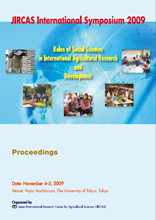General Explanation on the Three Sessions

General Explanation on the Three Sessions
Facilitator: Before that, we will start the General Explanation on the Three Sessions by Mr.
Masuo Ando of JIRCAS.
Masuo Ando: I’m Ando of JIRCAS. Before entering the symposium, I’d like to explain
briefly about the purpose of this symposium.
As you know, the main mission of JIRCAS is providing effective solutions to international
food supply and environmental problems through technology development in developing
countries. According to this mission, I am sure that technology development is the most
important and indispensable factor in our institute. In other words, JIRCAS is a research
institute mainly for technology development but I never think that the social sciences are
not necessary for technology development. On the contrary, I am sure that the social
sciences are more important and useful or helpful for technology development because
technology is used by humans or by human society. Agricultural technology has the
impact on rural society as well as farmers or sometimes technology changes the social
relationships and oppositely, agricultural technology must be modified by the farmers or
rural society.
Accordingly, with this close relationship between technology and human society, we are
often asked the following questions: What kind of technology should the technical
researchers develop in order to increase the farmers’ income? Or what kind of impacts do
the innovative technologies have on rural societies? How should we introduce and extend
the new technology efficiently or effectively among the farmers? To answer these
questions is one of the most important roles of social sciences. So, it is worthwhile
discussing how social scientists can contribute to technology development.
By the way, the social sciences are useful not only for farmers but also for policymakers.
Recently, policymaking is having stronger impacts on the world’s economy as well as the
domestic because each national economy is closely connected with the world market, and
also climate change all over the world is now having serious influence on the agricultural
production in each country. We can still remember that the prices of the main crops have gone up sharply in the last two years which makes the poor people suffer more in the least
developing countries. So it is not too much to say that the weather, whether the
policymaking is proper or not suitable, is directly connected with the starving to death or not,
of the poor people. To solve this kind of problem, I am sure that that the social sciences,
especially Economics, may be very useful and practical for the policymakers and it might
be necessary to formulate a policy from the global point of view as well as domestic.
Considering these roles of social sciences, we have prepared three sessions as follows.
The First Session is concerning the impacts of the globalized economy and climate change.
In this session, the main issue would be the perspectives of agricultural production and
consumption under the influence of global warming and I would like you to discuss about
the implications to policymaking for food security from the viewpoint of economics.
Dr. Furuya of JIRCAS will serve as the moderator for this First Session.
In the Second Session, we are focusing on participatory research and rural development.
As you know well, many people pay more attention to participatory development especially
after the 1990s. In this session, we will be reviewing the background, significance and
problems of participatory development. We would like to discuss about the contribution of
the participatory researches to rural development through the suggestive and instructive
case studies.
Dr. Yamada of JIRCAS is the moderator for the Second Session.
The Last Session is concerning the impact assessment of agricultural technology. I think
the theme is directly connected with our JIRCAS mission as I mentioned before and also
very closely connected with the Second Session because agricultural technology is one of
the most important factors of rural development.
In the Last Session, we can find various levels of assessment of technology, for example at
the society level or public acceptance level or environmental level as well as at farm level.
We would like to discuss in this session how these various kinds of assessments can
contribute to agricultural technology development.
Dr. Yokoyama of JIRCAS will serve as the moderator for the Last Session.
That is about all I would like to tell you about this symposium. Of course we know that
these three sessions can never cover all the roles of social sciences, so we would like all the participants here to propose the other roles of social sciences in the General
Discussion.
| Date of issued | |
|---|---|
| Creator | Masuo Ando |
| Publisher | Japan International Research Center for Agricultural Sciences |
| Available Online | |
| Issue | 2009 |
| spage | 33 |
| epage | 35 |
| Rights | Japan International Research Center for Agricultural Sciences |
| Language | eng |
